#of her misogynistic society's standards
Explore tagged Tumblr posts
Text
Another round of asoiaf "prettycourse", another round of people ignoring Arya's self-esteem issues and how it relates to her arc because their enjoyment of the series hinges on an 11-year-old being considered ugly.
#arya stark#asoiaf#fandom nonsense#/looks don't matter/ but they're the ones firing up this discourse every few weeks cause they can't handle what's written in the books#grown ass people logging on every day to talk about how Arya HAS to be ugly or her story is ruined/makes her less interesting#at what point do you get tired of being so invested in how a character (one you obviously don't like at that) is perceived?#we aren't the ones shipping her with every grown man in the series and using a predator's words to fawn over her beauty#never any discourse around a 13 year old being the most shipped character in the series nope! the real issue is that we don't#consider Arya's bullies to be the ultimate authority on her looks!#where are the essays on how Arya shouldn't have been made to feel lesser based on her looks? how she should be able to have worth outside#of her misogynistic society's standards? why is it literally ALWAYS just /Arya is ugly...that's enough analysis for today/????#if her looks don't matter then you can simply stop creating discourse around the subject and let people have whatever opinions they want
49 notes
·
View notes
Text
eloise does have one talent though: comedy. if and when she learns how to harness that talent, she will be unstoppable
also eloise bridgerton is conceptually the most hilarious character on the whole show. claims to be a feminist but every time her fellow women talk about their artistic pursuits or hobbies or interests or ambitions she’s like ugh you all fucking suck. not me though. i’m different. i want to be like my brothers. and then she has no real talents of her own. she’s not a feminist she’s still a reactionary turbohater AND a girlfailure. what she’s trying and failing to articulate is that she’s a lesbian.
#on a serious note though: eloise does not understand that she is about as privileged as a woman can be in her misogynistic society#her family is extremely wealthy and also loving and supportive#they're not gonna throw her out on the streets for perceived transgressions and can afford to financially support her if she never marries#so she can afford to be (rightfully) critical of her misogynistic society#but she doesn't understand that many women have no choice but to play by the rules and marry well or face ostracisation and poverty#anyway i love my girlfailure daughter even if she is not much of a feminist by modern standards#i can't not love a gay disaster#bridgerton
6K notes
·
View notes
Note
big question. i'm cis (afab) and my gf is trans (amab) and i'm sorta having a hard time reconciling something. i've been a hard line feminist since i was about 8, by 12 i was a practical library on everything and anything womens lib. i'm spending a lot more time around trans people especially my gf now and i'm sorta struggling to reconcile the trans experience with my feminism. like- i'll see trans women being like "i hate my body :(" "my voice is awful" "i need [x thing to try to pass] ugh" and like my first thought is always "NO! THATS HOW THEY FUCKING GET YOU!!! THE PATRIARCHY WANTS YOU TO HATE YOURSELF SO YOU ENSLAVE YOURSELF TO CAPITALISM AND LIVE IN A CONSTANT STATE OF NEED FOR NEW PRODUCTS TO WARD OFF THE EVER PRESENT SELF HATRED BROUGHT ON YOU BY SOCIETY" and they go "well then how do i pass/transition?" and i honestly don't know and i also don't know how far it goes before its no longer dysphoria but instead the intentional subjugation of women by patriarchy for profit. i wanna help my fellow ladies but i honestly don't know how to like- apply the feminism i was taught as a child to trans women and i want to learn as soon as possible so that i can start doing it like yesterday
hi there,
I'll be honest: if it feels hard to apply the feminism you learned as a kid to your trans friends, that's probably because the feminism you were taught didn't have trans woman in mind.
luckily, the answer to this is something that I consider to be feminism 101: what a woman does with her body is, ultimately, her fucking business.
listen: I agree with you that the beauty industry(TM) is evil. it's misogynistic, it's exploitative, it thrives by making women feel bad enough about themselves to make them spend money on shit they don't need, etc. we all know this.
now, having said that: women who like makeup or wear heels or get laser hair removal or whatever other asinine thing are not my oppressor, nor are they my enemy. dare I say, we have bigger problems.
we also need to consider that many trans women are coming to these choices from a VERY different place than many cis women are. while I think my fellow cis women really benefit from reminders that they're allowed to stop shaving or wearing eyeliner or dieting or whatever, that's because most of us have had those actions forced on us from very young ages and may genuinely need a hand to feel secure breaking out of those behaviors.
the majority of trans women are not coming from a background where they were encouraged to partake in the same personal grooming habits and modes of presentation as cis women; many of them have, in fact, been ostracized, bullied, threatened, and otherwise hurt because of forays into forms of presentation that are considered feminine. no matter how good your intentions may be, approaching your advice indelicately can, unfortunately, make you come across as no different than any transphobe on the street trying to enforce cisnormative societal expectations. it also must be said that, for many trans women, the ability to "pass" is a matter of security - for having their status as women recognized at all, and to avoid harassment and abuse in public spaces. if you live in America, like I do, politicians in power currently have an extremely explicit anti-trans agenda that can make it harrowing to be visible as a trans person, and trans women in particular are frequently targeted for violence.
there are absolutely critiques to be made the way the many trans women are expected to perform hyperfemininity. the notion that someone is duty bound to drastically change their appearance in order to transition at all is itself extremely rooted in cisnormativity, and "passing" is often contingent on being young, thin, able-bodied, reasonably wealthy, and hewing as closely to Eurocentric standards of beauty as possible. that's not awesome! but that's also not the fault of any individual; no trans person asked to be born into a world where gender norms are so narrow and failing to pass can come with a very real risk of physical danger.
also, if I can circle back to this: again, women who participate in aspects of the beauty industry are not our enemies. there are always going to be some number of women who enjoy doing their makeup or like spending time fussing over their little outfits or want breast implants or whatever. some of those women are going to be trans. my official feminist stance on this is that I don't give a shit, because I believe in bodily autonomy even when it involves things I would not do personally and the choices that individual women make about how they want to style their little meat body don't even crack the top 100 things that I'm worried about right now. it's actually kind of vitally important, politically, that trans people be able to safely pursue their preferred gender expression; while it's not particularly revolutionary for a cis woman to go outside all dolled up, whether a trans woman can do that safely is a pretty basic litmus test for how safe a given space is for queer people. it's a ridiculously low bar, and many places will still fail to clear it.
so, yeah, I don't know, dude. be there to talk to your trans girlies if they want to start unpacking some of the pressure they feel to conform to a very rigid idea of womanhood, but whether or not they can walk down the street in your neighborhood safely is a WAY bigger issue than whether they decide to do voice training or not.
if you really want to cut to the root of the insecurity and vulnerability that the beauty industry thrives on exploiting, your time is much better spent working to ensure the trans women in your life feel safe and supported and have a community where they can find support regardless of how they look.
necessary disclaimer I'm a cis girl, any transfemme folks please share your voice here and feel free to clap my ass if I've said something out of line.
648 notes
·
View notes
Text
Occasionally JK Rowling says or does something so offensive to my sensibilities that I must speak. Sadly, today is one of those days.

This post, and the "male" she is referring to is a cis woman boxer from Algeria. There is an unconfirmed report that she might have an intersex condition in which one's chromosomes are XY. She may not even have this condition, but even if she does, it does not mean anything but that she has an unusual DNA quirk. We do not call Tom Cruise a woman for having an extra X chromosome, for example (nor would I expect Rowling to accept it if he decided to compete as a woman in the Olympics).
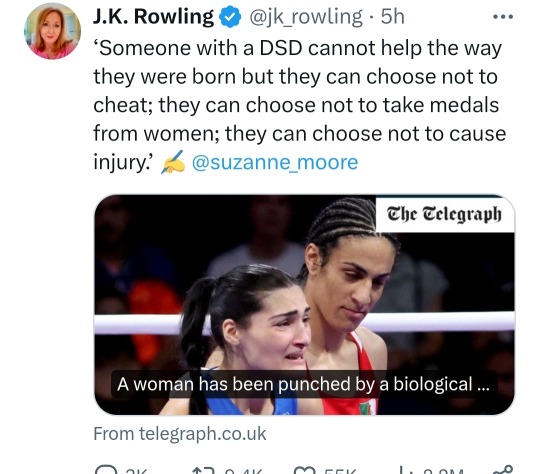
Now Rowling, upon being pointed out that she essentially pulled the twitter equivalent of Austin Powers punching that old lady because she "looks rather mannish", moves the goalpost. She claims, against evidence, that she an unfair advantage, going so far as to imply that simply by competing with a rare condition this woman has cheated.
This might seem bizarre coming from a self professed FEMINIST. It is the contention of anti trans "feminists" like Rowling that womanhood is being erased and destroyed by "trans ideology"; Yet here a cis woman achieves a olympic victory and they accuse her of being a man, of cheating. They erase her achievement, they erase her womanhood.
The subtext is racist and misogynistic - a strong Algerian woman with features that do not reflect Western beauty standards is being denied the very womanhood that TERFs claim to protect. She has lost to women before, she has no clear advantage... Yet by virtue of her looks and a possible rare genetic condition, she is now a "man" and a fraud.
This doesn't surprise me, and I suspect that anyone who has had to deal with TERFs will agree. But in case anyone is shocked here's my take:
TERFism has always been a reactionary movement. While it draws from second and third wave feminists and has an ideology on paper, any space with TERFs will tend to feature mad crusades accusing cis women of being trans on looks, attacks against sex workers that are harsher than those on the men who make that industry dangerous, few towards actual men, and a sense of outrage that trumps any real ideology.
It is feminism much like how "National Socialism" was socialist. And like the Nazis did with socialism, it uses the idea of feminism to legitimize attacks on perceived enemies while preserving the status quo. For TERFs that's traditional gender roles, which they have twisted into something that protects women rather than subjugates them. (This is not to say TERFs are Nazis, but it is a decent comparison because fascism is the ultimate reactionary ideology; full of symbolism and mythology yet devoid of any substance but machismo and hate.)
In a nuanced, good faith society, we might discuss trans women in sports using science to determine whether there are unfair advantages, and consult stakeholders and experts in sport and biology. We might study if chromosomes do impart an advantage, and weigh that against the other myriad genetic advantages like long reach or faster muscle gain to determine if there is any problem with current regulations. We might not do these things too, considering we have gone the entire history of sport without a single women's league collapsing from secret "male" invasion.
In Rowling's world, we first attack the winning woman as a "man in disguise" and rail against her without evidence. We have people replying "just look at HIM, he is clearly male". We have people writing violent revenge fantasies in which the Algerian woman gets beaten by a man or a gang of women to "teach her a lesson"... and JK does not once jump in to say any of it is inappropriate or hurtful to women who happen to have androgynous features, like some less fanatic people sharing the story have done.
When this is how their "ideology" reacts to an apparently "male looking" woman winning, we have to ask whether the liberation of women was ever the goal.
And the one thing that makes it all make sense, IMO, is that it's the lashing out that's the point. These people seem to enjoy calling a cis woman a man in much the same way they enjoy calling a trans woman a man. They enjoy the feeling of power as together they act cruel towards a woman who had the audacity to beat a white European. They seem to relish the ability to present themselves as feminists in one breath while brutally harrassing and demeaning women. Unlike ordinary bigots, they constantly bring up their crusade, as if they're growing dependent on the thrill. The cruelty, as they say, seems to be the point.
The danger of these ideologies is really becoming obvious ahead of the US election. Years of social media bubbles and astroturfing have made people like Rowling convinced that they are a silent majority, ironic for people who can't shut up.
Times like this I think are important reminders of where this can really lead. They may spin about being gender critical or concerned about women when the pressure is on; This is what these people do when they think they can get away with it.
This is the dark heart of their movement, beating loud enough to hear.
#anti jkr#unsolicited essay#jk rowling#trans inclusive radical feminism#pro trans#nonbinary#terfs hate women
595 notes
·
View notes
Text
"It’s no longer 1937… she’s not gonna be saved by the prince."
The absolute DISRESPECT for the FIRST ANIMATED MOVIE EVER MADE and its female character who was strong in her own way! The DISRESPECT for Snow White coming from people who plan to """update""" her story??? I'm FUMING. i am FURIOUS. This is the SAME shit I said about Girlboss Cinderella do you understand???
Snow White was an abused CHILD who was isolated within her castle and then suddenly thrown into the woods and she managed to survive using only her hope and kindness!!! She found a house and offered to work to earn her keep and she DID!!! Snow does not have to be a badass to be a strong female character. And more importantly, SHE DOES NOT NEED TO BE "BADASS" TO DESERVE HER HAPPY ENDING. Some of us in abusive situations CANNOT escape on our own. We CANNOT physically fight back and WE STILL DESERVE HAPPY ENDINGS.
Women don't have to be badasses in order to be strong female characters. So she needs to be saved-- so WHAT? Saying Snow White is an antifeminist character solely because she doesn't save herself is offensive to abuse survivors and to the original character who WAS a good character. You can criticize OTHER parts of the movie– the implication that men living without women will be useless and filthy the entire time, or we can discuss the Queen’s feud with Snow being fuelled by misogynist standards, etc.!! But just saying “she needs to be saved so it’s bad” LIKE. ARE YOU SERIOUS
Badass Snow White reboots are fine in moderation, but just like Girlboss Cinderella reboots, too many and it becomes clear what society is trying to say now- that if you're feminine and can't fight a battle, you don't deserve to be saved. Do you see why this is a bad message????? Some girls are badasses who can kill and fight as well as or better than the boys. Those girls have Mulan, Merida, Raya, Moana, Rapunzel, Elsa. They are good female characters. But you know what? So is Snow White. So is Cinderella.
I'm sure people are going to accuse me of being antifeminist for saying “oh she NEEDS to be saved by a man”– I’m NOT SAYING THAT. You could have her be saved by a woman. Be saved by the dwarves, her platonic friends. By the animals. You could write a badass Snow White reboot without being disrespectful to the original film or tale. Just fucking TODAY I read the Disney Mirrorverse Snow White book– it’s written for 13yos basically so not high art but even with them having to make her an adaptational badass, they managed to keep her personality PERFECTLY. She learns how to save herself in this book, but also remains HERSELF. And her previous inability to fight was NOT CRITICIZED by any character; her sudden badassery was a bonus for her, not an indication of her character!!!
YOU are the ones saying that if Snow White (and Cinderella) isn't saving herself, she doesn't deserve to be saved. But everyone deserves happiness and that includes those too weak to fight for it alone.
anyway that was a long feminist rant. this is also super disrespectful to the FIRST ANIMATED MOVIE EVER, the people who worked on it, Walt Disney himself, and everyone who enjoyed or was inspired by it. You absolute fucking dickheads.
also can't believe i have to say this but if y'all use this as an excuse to be racist towards anyone in the cast i will hunt you down and put shoelaces in your lungs
2K notes
·
View notes
Text
say what you will about alicent and her character arc and her personality. is she a good person? no. is she a good mother? no. does she hold up to today's standards of the ideal woman? HAHAHA no. but you know what i fucking hate? when ppl say some shit like "i love young alicent but i hate older alicent" or like "i feel bad for younger alicent but i can't defend older alicent" like are you stupid??? do people not realise that alicent becoming an adult literally changes nothing? she has never had autonomy or freedom and has always been a pawn in the political games of the men around her. she is a woman, and therefore naturally inferior to men in the society she lives in and isn't a princess who can afford to rebel and want something of her own (see: rhaenyra). she's done everything for her family, her house, her duty and never has she really dared to want or reach for anything for herself. and none of that changes when she gets older?? ppl act as tho turning 18 or 20 or 25 means she gains any semblance of freedom or autonomy because she doesn't?? the system she was born into has existed long before her and she can't singlehandedly break it down and doesn't even try. ppl calling the patriarchal system of westeros the system alicent set up is insane because the system has existed for MANY years. and ppl saying alicent discovered misogyny in season 2 ep 5 as if she wasn't a child bride??? as if she hasn't been a victim of the system her whole life?? girl i hate to break it to u but everyone in hotd is a misogynist. that's the culture, that's the society, it's ingrained into all of them. ppl acting like alicent is some exception to the rule is so infuriating bc the fandom for whatever reason is so much harder on her than any other character (some of which do so much worse than she does) and it's like woah! looks like these characters in this medieval fantasy setting aren't the only ones with a lot of internalised, deep-rooted misogyny!
#ready for the haters#idc i will defend alicent till the day that i die#house of the dragon#hotd#alicent hightower#team green#zoe yaps
220 notes
·
View notes
Text
Jupiter Dominant Women & Daddy Issues
TW: mentions of rape, abuse, suicide etc
Over the years of my studies, I have noticed that its Jupiter dominant women who tend to have daddy issues more than any other planetary dominance. Solar women (Uttarashada, Uttaraphalguni & Krittika) tend to benefit from positive male influence in their early life, so they have healthy Yang qualities (they're driven, self-motivated, critical thinking) whereas women who haven't had a healthy male influence in their early lives, either develop a heightened but fragile femininity (understood in a very traditional way, this means being passive and excessively reliant on others to get by, I know this is misogynistic but i am talking strictly about a traditional notion of femininity) or they cultivate inner masculinity.
Jupiter is a masculine planet and across the naks of Punarvasu, Vishaka and Purvabhadrapada, women tend to have a very unguarded, open, almost masculine presence. I mean this in terms of what they talk about or how self-assured they seem, traditionally women were expected to be more withdrawn or to talk little. I don't mean to say Jupiterian women are brash or aggressive, they're very poised, and elegant and put across their point eloquently. They're 9/10 times very well-spoken. When one lacks the security of a male figure early in life, one tends to cultivate inner masculinity because it's understood that you cannot rely on any man.
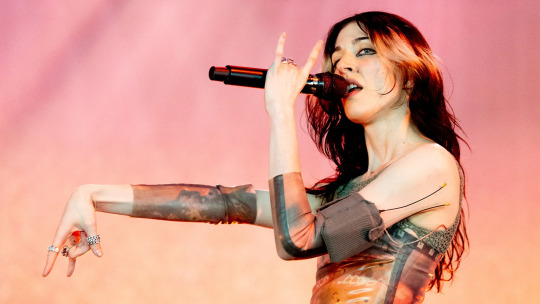
Caroline Polachek, Punarvasu Moon, has spoken about her difficult relationship with her father on numerous occasions. Here's a link to a post where she talks about it. Her lack of a father figure in her own words caused her to be "self-sufficient". Notice how in the post, she speaks about making amends with him later in life and even ended the post with "love you dad". This is the kind of generosity that you don't see from most other nakshatra types. To forgive someone who was never there for you/abused you/hurt you/caused you immense pain, requires a great deal of strength and maturity and not everybody has it. Punarvasu's innate nature is to absorb everything into its orbit and always be the bigger person. Due to the vast, abundant nature of Jupiter, they are ABLE to, accept these people for all their contradictions and see them as flawed, which makes it easier to forgive them. Most people let their traumas define their identity (im not saying traumas don't shape you, only about the kind of perception most people have about their own traumas) and spend their whole lives blaming others for who they've become or what they've done to them. To live a peaceful life, one has to take the high road, look beyond everything and see it as a part of life. It sounds very callous when I say it like that but that's what I mean. Not everyone is capable of being the bigger person or taking the high road.
Jupiter is the guru or teacher and how would one describe an ideal teacher? Someone who forgives the mistakes of their students as having risen out of immaturity and forgives them for not knowing better or being better. A teacher is forced to operate on a higher moral plane than others simply because chaos would descend if the teacher came down to the level of others. They are figures of wisdom, knowledge and higher learning, therefore their behaviour has to reflect the same. Jupiter natives are harshly punished for behaving in ways that are not fit for a "guru" because subconsciously society/those around them subject them to a different standard. Others can do the same exact thing and not suffer any consequences but when a Jupiter native behaves that way, they're ostracized. People kind of expect them to have it all together or be better. Any lapse on their part is judged harshly.
One of the biggest mysteries is how Jupiter natives emerge from often brutally abusive and neglectful childhoods into relatively well-adjusted adults. In the case of famous parent-child situations, there is public proof of their wrongdoing but in numerous other instances many do not believe Jupiter natives to have suffered the way they have or to the extent they have simply because on the outside they seem to have it all/seem so put together. This is yet another manifestation of Jupiter's duality and this not being believed/seen for who they are/how they've lived can be a source of pain/grief for some of these natives whilst others like to pretend it never happened and present a very positive view of their life. They don't hold grudges and often simply overlook the horrible nature of their loved ones, especially their parents and try to make amends with them.

Drew Barrymore, Punarvasu Moon, comes from a very famous family of actors but her father John Barrymore was a violent alcoholic and a drug addict who abandoned her & her mother when she was a child. She did not have any relationship with him and seldom spoke to him until he was diagnosed with cancer. She took care of him and even paid his medical bills until he passed away in 2004. Here's an IG post where she talks about her dad. It's so touching to see the compassion with which Punarvasu natives talk about people who've hurt them so much (in her memoir, Drew recalls how one time her father picked her up as a three-year-old and threw her against the wall). Truly, I don't see this level of kindness in any other nakshatra if I'm being honest. This is a photograph of her with Steven Spielberg who directed her in E.T when she was 7 years old, he's kind of a godfather figure to her and she apparently asked him to be her dad when she was a kid 🥺🥺
I also think Jupiter natives have a complicated relationship with their mothers as well, sometimes they're extremely close but other times, I think Jupiter natives feel the need to be their mother's saviour because they know how much she's gone through in her life. This manifests itself in a very complicated relationship. There is love but there is also a lot of bitterness.
Drew Barrymore has a very complicated relationship with her mother, who used to date the men Drew dated, pushed her into acting and exploited her as a child and admitted her to a psych ward when she was 12 among other things. Drew still takes care of her financially and has mentioned that her mother has even tried to steal money from her.
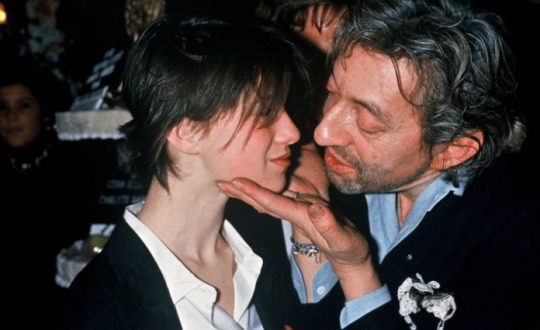
Charlotte Gainsbourg, Punarvasu Moon is the daughter of Serge Gainsbourg and Jane Birkin. Her parents separated when she was a child and she lived with her father. In 1984, she did a duet with her father and starred in the music video for a song called Lemon Incest which describes an incestuous relationship between father & daughter. She was 12 years old at the time.
youtube
The music video is creepy, to say the least and features both of them half-naked in bed together. In 1986 when she was 14, she starred with her father in a movie called Charlotte For Ever which is about an alcoholic man whose only link to life is his daughter (Serge was an alcoholic). She has spoken about how difficult the filming experience was for her as he would push her to her extremes.
youtube
Here's a very uncomfortable clip of him kissing her on the mouth when she wins a Cesar. She is 16 years old.
Jane Birkin commented on the song saying "It never came as a shock or a surprise or even a worry [to her], knowing Serge's great love for Charlotte". Many believe that Birkin enabled Serge's abuse of their daughter since she left him due to his alcoholism and violence but left Charlotte in his care. She has also stated that her mother would always dress her up as a little boy when she was a child and that this complicated her relationship with her femininity.
Charlotte has only ever said good things about both her parents and denied any abuse.
She's also starred in multiple films directed by Lars Von Trier where she plays gruesome sexually depraved characters and Lars is well known for being difficult to work with. She has said that she sought fatherly approval from him ._. and again has only said good things about him.

Kali Uchis, Punarvasu Sun, Vishaka Moon & Rising has spoken about being abused as a child and that she no longer maintains contact with her family. She was kicked out of the house when she was 17 and slept in her car and worked at a supermarket for years to support herself.

Halsey, Punarvasu Moon. She grew up poor and has spoken about her difficult childhood, both she & her mother suffer from bipolar disorder and in her song Whispers she sings “Why do you need love so badly?/ Bet it's bеcause of her daddy." In the Armchair Expert podcast, she said that she has both "mommy and daddy issues".
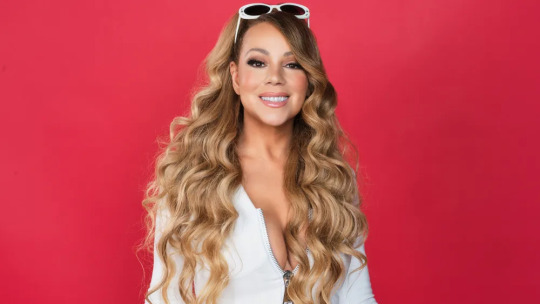
Mariah Carey, Punarvasu Moon, has published a very revealing memoir about her life where she chronicles the abuse she experienced from her family. She had a moderately good relationship with her dad but was estranged from him as an adult. Her mother however continually exploited her for money.

Miley Cyrus, Vishaka Moon has a complicated relationship with both her parents. Currently, she's not on speaking terms with her father after he married a woman around Miley's age.
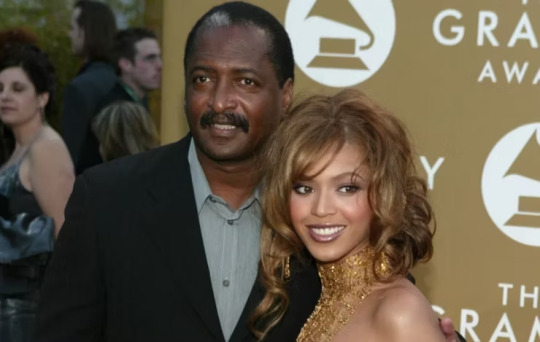
Beyonce, Vishaka Moon has been performing since she was a child and was in a girl group Destiny's Child which was managed by her father. She dropped him as her manager in 2011 and in the same year, his divorce from her mother was also finalized. He had apparently fathered a love child with another woman in 2009 and this was the reason for their divorce. Some speculate that they are now estranged but in typical Jupiter fashion, she has never bad-mouthed him in public. Jupiter natives do not air their dirty laundry in public ever. Their grace and dignity even in the face of extreme humiliation/shame/pressure is commendable.

Jennie, Vishaka Moon is very close to her mother but she's never mentioned her father in the 8 years since her debut. In the Blackpink documentary, she said that growing up it was just her and her mom. In this interview she spoke about living with her mother and how she never got a chance to spend much time at home as she was sent to boarding school at 8 years old. She remarks that she and her mom are like sisters but she's never said anything about her relationship with her dad, ever. I am not going to assume that they have a bad relationship but I thought it would be interesting to mention.

Demi Moore, Vishaka Sun
Moore was born to a 19-year-old mother and her biological father left before she was born. The actress' mom remarried a man who worsened her problems with alcohol, which led to violence and instability. The family moved many times throughout Moore's childhood and when she was 17, her stepfather committed suicide. In the early '80s, she embarked on her acting career and helped her mother stay in rehab throughout the years. In 1997, her mother was diagnosed with brain cancer and she reunited with her in the final months before her death.

Lily Collins, Purvabhadrapada Sun
Lily had a strained relationship with her dad growing up“Because my dad was often gone, I never wanted to do anything that would make him stay away even longer,” she wrote. “I became extra careful about what I said and how I said it, afraid he'd think I was angry or didn't love him"
She penned an open letter that said: "I forgive you for not being the dad I expected. But it's not too late”.
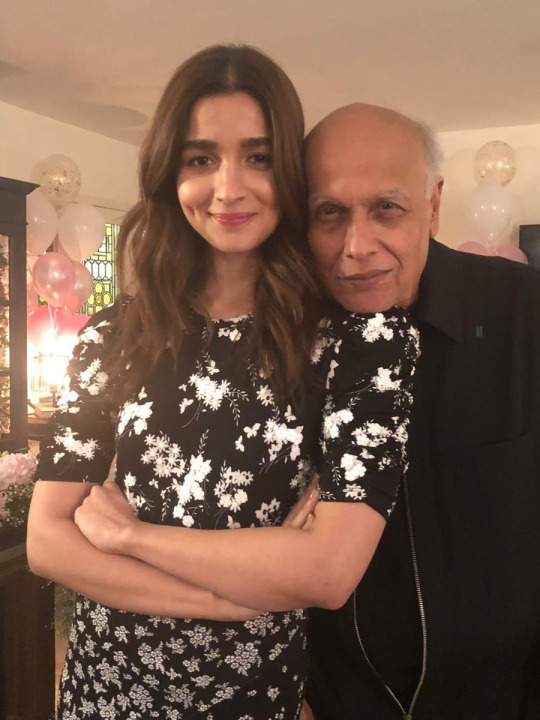
Alia Bhatt, Purvabhadrapada Sun has said that growing up she saw very little of her filmmaker father Mahesh Bhatt who is known in the media for being a very problematic figure. He once posed for a magazine cover in the 90s with his daughter Pooja Bhatt where they're kissing on the lips (Pooja is Alia's half-sister) and said that he would have married her if she weren't his daughter 🤮🤮Mahesh is known for being a very temperamental man (you'll be hard pressed to find a video of him not screaming) and it's quite well known that he and Alia's mother had a pretty rocky marriage that her mother could not leave as she was financially dependent on him. Her sister, Shaheen Bhatt has talked about struggling with depression and suicidal tendencies since she was a child.
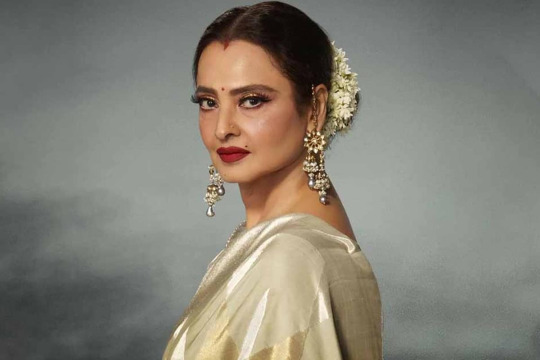
Rekha, Purvabhadrapada Moon is the illegitimate child of actors Gemini Ganesan and Pushpavalli. Her father was already married to another woman when she was born. He refused to accept the paternity of Rekha and her sister Radha and she grew up in the same city that her father and his "legitimate" family lived in and attended the same school as her half-siblings where she occasionally saw glimpses of him dropping his other kids to school. She has stated that growing up she was called a "bastard" and that the only male figure in her life was "God". She made her debut as an actress when she was 13 against her wishes because her family had fallen on bad times and she had to work to support her 6 siblings and ill mother.
This interview of hers offers a glimpse into her early life. Regardless of what she's been through, Rekha has always been stoic and conducted herself with immense grace and dignity even when she received an award from her father who was never a part of her life. She said this in response:
“Why should I grieve for him when he’s so much part of me? Why should I grieve when I’m so grateful for his genes, his teachings, his rich life and his sheer existence? Grieve for what??!! I’m happy I didn’t have to share unpleasant moments with him. He existed for me in my imagination. And that’s so much more beautiful than reality. Everything I love is unqualified by worldly time constraints. I’m just a small link in the larger scheme of things. I’m not the first one to go through death, nor am I the first one to receive an award. I’m enjoying everything that comes my way…good bad or ugly. I try to make good use of what life’s experiences offer. I think I’ve done a good job of my life, whatever others may think.”
The Jupiterean ability to always look at the bright side and forgive people who don't deserve your forgiveness is heart-breaking but enlightening at the same time.

Rita Hayworth, Purvabhadrapada Moon confided in her husband Orson Welles that she was sexually abused by her father as a child and had been repeatedly raped by him.
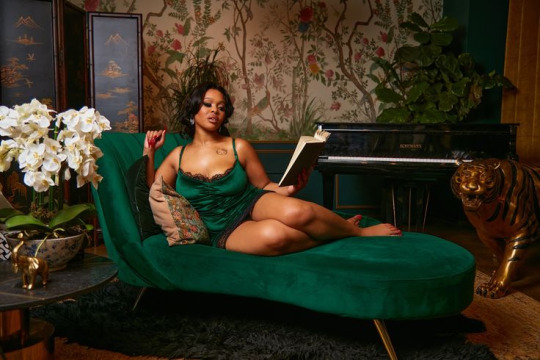
Elexus Jionde aka Intelexual Media, Punarvasu Moon has mentioned that she's estranged from her father.
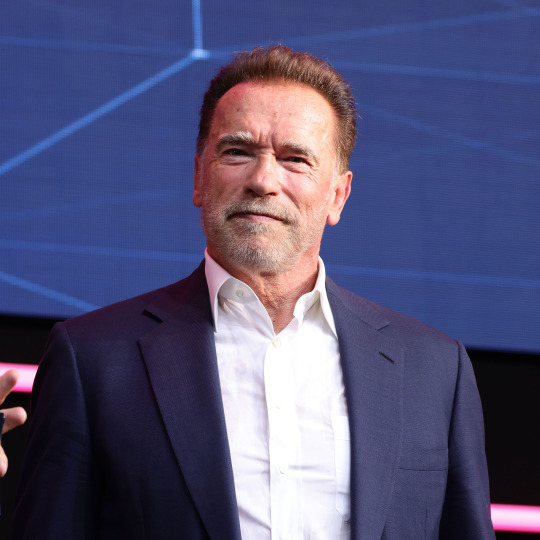
Arnold Schwarzenegger, Punarvasu Rising & stellium has spoken about being emotionally and physically abused by his parents especially his father who would beat him up. They also abused him because they thought he was gay due to his preoccupation with the male physique (he wanted to be a bodybuilder and would later become Mr World).

Keanu Reeves, Punarvasu Moon has been estranged from his father for the majority of his life. Charles Reeves abandoned the family when Keanu was 3 yrs old.
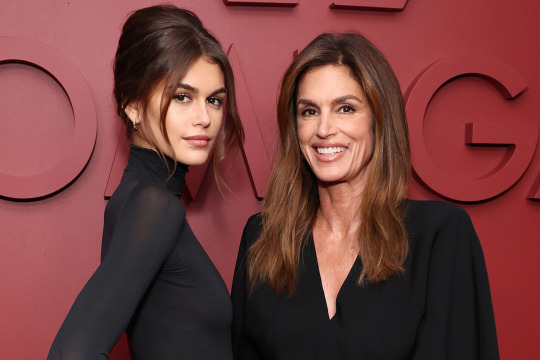
Kaia Gerber, Purvabhadrapada Moon has like most other Jupiter natives kept a low profile and seldom spoken about her personal life and has only ever said nice things about her parents. Her father Rande Gerber has been accused of sexual harassment by multiple women and there have been blind items about Cindy putting Kaia on a calorie deficit diet since she was a child to prepare her for a modelling career (this is awfully common among celebrities so I don't even think this is a stretch). When Kaia was 7 years old, her parents were threatened with a picture of her, barely clothed being gagged and bound. It was said that the picture was taken by a female babysitter during a game of cops and robbers because she wanted to prank the Gerbers by pretending to kidnap Kaia (sincerely, wtf) but there have been conspiracy theories that perhaps Kaia was abused by her parents and this picture was leaked from their collection. Anyway the matter has been settled and it feels wrong for me to speculate too much but I thought I'd mention it anyway.

Asia Argento, Purvabhadrapa Moon, is the daughter of filmmaker Dario Argento and has said that she never saw her father as a child and had no kind of relationship with him until she started acting in his movies when she was 16. She said "I never acted out of ambition; I acted to gain my father's attention. It took a long time for him to notice me. … And he only became my father when he was my director."
Her characters in his movies were undressed, raped and generally psychologically traumatised on screen. She once said:
"But I always had this feeling of never being a part of anything, not even of my family. My parents forgot about me. I did everything I could to get their attention."
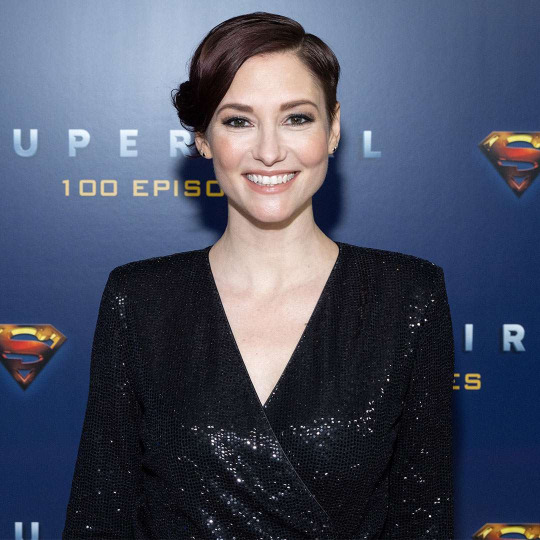
Chyler Leigh, Vishaka Moon. Her parents divorced when she was 12, following which she was estranged from her father for many years. Her mother moved her to LA when she was a teenager so that she could pursue an acting career. At 15 years old she starred in a movie called Kickboxing Academy as her biological brother's love interest (he was 19). She is said to have been manipulated into doing so by her mother. She has said in a recent interview that she's been estranged from her mother for over 20 years and that like her mother, she too suffers from bipolar disorder. She said, "Because I was put in a position to support my mother, I didn't get the opportunity to speak about my own feelings when I was in my teens." She moved out of her mother's house to live with her then-boyfriend and now husband Nathan West.
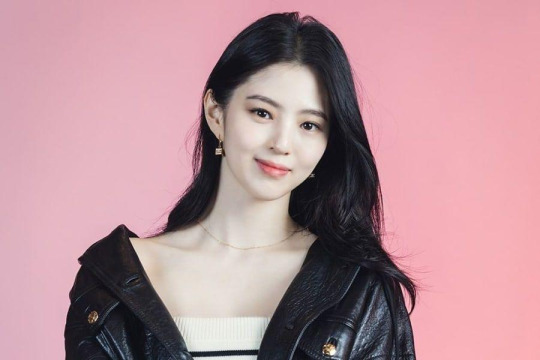
Han So Hee, Vishaka Sun was in the news when her mother using her name to borrow bank loans and her debt became public news. Its very rare to hear about the private life of a celebrity in Korea but Sohee came forward to clear things and said her parents divorced when she was 5 following which she was raised by her maternal grandmother with whom she lived until she was in highschool. She's estranged from both her parents and only realized that her mother had been in debt after she turned 18. She found out that her mother had been borrowing money under her name illegally ever since she was a minor. She paid off this debt and apologized to everybody concerned.
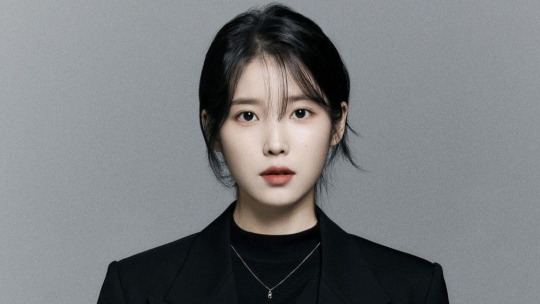
IU, Purvabhadrapada Moon grew up in poverty. Her family fell into debt and she was raised by her grandmother who could barely take care of her and her brother. She saw little of her parents growing up. Its unclear how close they are now.
I realize just how many of them are nepo babies lol but I'm kinda glad because it means so much of their life is on public record. Its really unfortunate to see that so many of these natives had absent fathers or fathers who were present in their lives and very abusive.
#Youtube#jupiter#vedic astrology#vedic chart#vedic astro observations#vedic astro notes#vedic astro#jyotish#vedicwisdom#purva bhadrapada#punarvasu#vishaka#astroblr#astrology
511 notes
·
View notes
Text
are we EVER going to talk about the ageism against women properly?
bc it has been growing rampant in gen z and the arguments against it aren't exactly addressing the issue through examining the double standards people have for women and men.
yes, ageing is a privilege but i don't think that this argument is doing anything to dismantle the patriarchal mentality that is ingrained in our culture.
in many ways, people's counterpoint to "women expire after the xyz age" is basically "well, ageing is a privilege and natural so you should be ok with being an expired undesirable grandma whose only purpose is taking care of children bc at least you're not dead". we are never going to actually dismantle the ageism against women if this is our only argument.
we have to address the fact that women aren't allowed the same standards that men are.
men are allowed to have two types of desirability - a boy and a man. we don't say that men in their 50s look good *for* their age, we say that they grew well into their age, we simply say that they are attractive 50 years olds.
but women can only be and feel beautiful and desirable if they are young. if a woman in her 50s is objectively fine, we say that she looks good *for* her age, insinuating that there is no way she could ever *just* look good at 50, no "for"s, since she isn't 19-25 anymore and that's the only age range when a woman is truly attractive and desirable.
isn't this actually abhorrent? the fact that people can live up to about 100 years but women are taught to believe that only in 6 of these years they are in their prime? that patriarchy tells women that after their early 20s they are expired and the only valid way for them to be desirable and beautiful is to try to replicate the qualities of the 20 years old version of themselves that according to the same patriarchy, older women can no longer posses?
and the argument that women should not wish to be desirable at all in the name of feminism is very faulty, imo. it often comes from young and pretty women who don't really understand what being deemed "undesirable" in society means. the assumption that women being ok with the patriarchy telling them that they should feel expired after 25, should feel like they looked better in their 20s even if they take a better care of themselves now, should just do the "grandma" stuff while their male counterparts still get to experience romance and the life to its fullest, is not going to be some kind of a feminism win.
the "ageing is a privilege" has started to feel like an argument for women to once again settle for the bare minimum (at least you aren't dead) and conform to the unfair limitations the patriarchy forces on women.
i think what needs to change is us giving these misogynistic double standards any sort of validation. they are not rooted in some kind of universal truth about the inherent difference between men and women, they are rooted in patriarchy. we need to stop acting like younger and older women are in competition and start acknowledging that both are desirable and beautiful in their own ways.
i know that this post won't get much traction, but i feel like we need to talk about this topic more bc the internalized ageism that gen z women have is going to mess them up and the counterpoints to their assumptions are sometimes weak and unhelpful.
edit: thanks for yall's input in the reblogs! i would love to hear more from people so please feel free to reblog and say all that's on your mind regarding this subject since we really need to start addressing this and keep the conversation going!
#feminism#misogyny#ageism#society#culture#women#girlhood#womanhood#beauty#beauty standards#gender#equality#patriarchy
91 notes
·
View notes
Text
So I've been wondering about one particuar point on the "Jiang Cheng marriage recquirement" list and it's the one about low cultivation.
Now on its face, except for the "must be nice to jin ling" point, the whole thing just looks like the most standard list of "ideal wife characteristics under a patriarchal society." naturally beautiful, graceful and obedient, coming from a good family, voice not too loud, etc. This leads to either the interpretation that jiang cheng really wants that (doubt dot png) or just... put all the most stereotypical things on a list even though that's not what he really wants.
In that context "cultivation must not be too high" sounds like a typical "men are scared of women who are smarter/stronger" thing. you know, the dudes who feel 'intimidated' when their wife or girlfriend makes more money than them.
...Except wasn't Yanli openly mocked for her low cultivation? Like, wasn't one of the reasons Jin Zixuan was such an ass to her initially because he shallowly assumed her lower cultivation made her an unworthy marriage candidate? Jin Guangshan may hate women who can read but society overal doesn't give the impression that high cultivation in women is seen as something undesirable. I mean... a wife that never looks like she's over 20 even as she starts aging? yeah I have no problem believing a misogynistic society is okay with high cultivation.
So if it's not there just to fit the stereotypical standard of an ideal wife...
Jiang Cheng, are you just describing your sister?
LIke?? Every single point on this list applies to Yanli. All of them. I don't mean this in a freudian incest-y way but in a "jiang cheng are you so unaware of what you want in a partner you just took the only woman you've had an unambiguously good relationship with and hoped no one would notice???" way. Does he know the difference in what you should like about your sister and what you should like in a spouse? Is he even aware he's doing this? Jiang Cheng answer meeeee.
#mdzs#jiang cheng#mdzs headcanons#mdzs meta#you can take this headcanon so many places#is he like this because he's gay? aro? actually attracted to women but too emotionally stunted to know what he even wants?#in cql canon the whole list imo becomes about wen qing#in a 'i'm still not over my dead not-girlfriend so all my recquirements are for someone extremely unlike her' way#is it self-sabotage? trying to avoid being reminded of her? who knows!#but in novel canon chengqing's not real so there it's about yanli#i mean the list isn't even IN the novel so depending on whether you consider word of god canon or not it doesn't even exist there#but it's so fun to play with#also i know in novel canon yani is described as at best 'above average' looks wise#but are YOU gonna tell one of her brothers she's not the most beautiful woman in the world?#i don't think so
292 notes
·
View notes
Text
maki is an interesting character, bc she is generally acknowledged to be one of gege's best written characters in jjk, period. regardless of gender.
but the reason she is so great, is because her arc is centered around her experiences as a girl in a patriarchal society. not one that fits into the standard either.
she's born into a family that is considered misogynistic by other clans' standards. as a twin, no less, which is considered a bad omen. with little to no curse energy to boot.
still, for a large portion of her life, she desired to prove herself to them. in a way that reminds me of the myth of meritocracy? that idea of "if you work hard enough, you can do anything you want and you can prove yourself to the naysayers."

but in her journey she learns it's impossible for her to rise in an institution that actively works against her.
this happens, specifically, when she goes to the zenin clan during the culling games (to simply collect tools). she's confronted by reality in ways that echo momo and nobara's conversation (about the weight of misogyny in their lives).
"A scar on the face can be a good thing for guys. But not for girls. You think the world of Jujutsu Sorcerers is based on skills? [It is] Sure. But only for guys. Even if a girl is skilled, if she's not cute, she is looked down upon. Of course, if she's only cute without any skill, it's the same. Women Jujutsu Sorcerers aren't expected to be skilled. They're expected to be perfect." (Momo, Chapter 40)
the first thing she is told when she visits the compound is "yikes, what a face. that ain't gonna heal. what are you gonna do Maki? [...] all you had going was your face and now it's wrecked. no one will even look in your direction anymore." (Chapter 148, p.2-3)

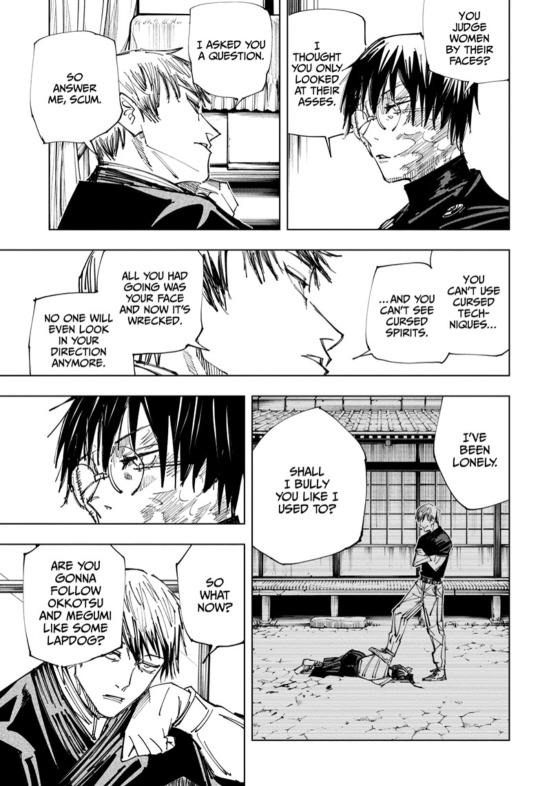
after that, she crosses paths with her mother, who, at face value, echoes the horror tropes of mothers that "fanatically conform to the institution" (i think her actions later make her more complex).
then, finally, maki comes across her father, who remarks on maki and mai's "worthlessness" to him. he's convinced himself he would be better off in life if they were dead.
maki's continuously told she has no value in this world. for things that are out of her control.
of course, this all leads to the loss of mai, who sacrifices herself in order to essentially push maki forward as a character bc "to gain something, you must offer something," in the world of jujutsu kaisen. this is not exclusive to them. it also leads to mai telling maki something that aligns really well with what "female rage" means to me:
"Destroy… Everything" (Chapter 149, p.12)
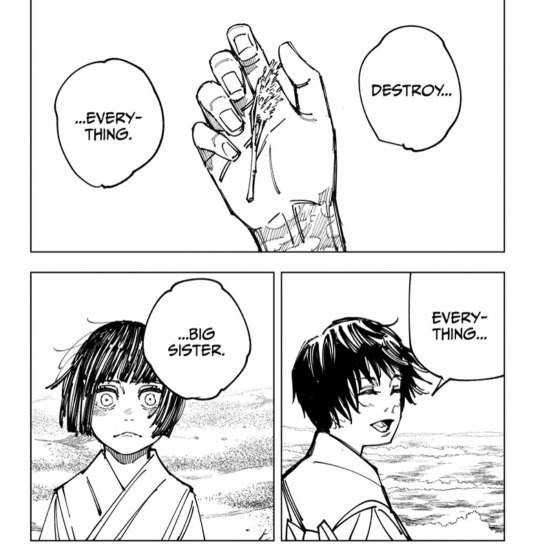
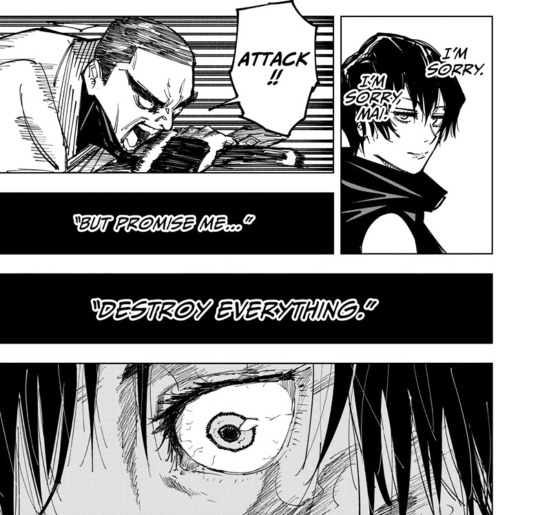
why?
i think there is no amount of climbing you can do in a society that is actively pulling you down. no way to become clan head in an institution that wants you dead.
i believe it's this realization that causes maki to embrace her "monstruous femininity" that ultimately results in her ascension (as a person, as a sorcerer).

i know some people criticize her decision to kill the zenin in honor of her sister's memory. but, i think the message here is that some institutions simply cannot be reformed.
also, note that with their destruction, maki's narratively released from their expectations.
anyways, what comes after is honestly hilarious. i think it's a mockery of what gege expected misogynistic readers to say. "you're not toji!" (Chapter 151, 6-19) as if drawing a parallel implies that she's his copy.
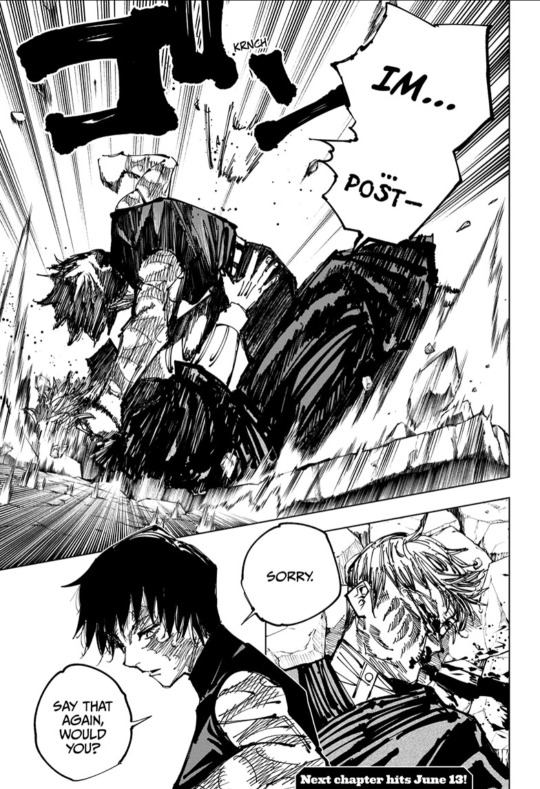
another charming detail to maki's character is how sumo helps her find freedom/her groove. considering how, in traditional sumo, "women are considered impure and cannot step into the ring". it's just something so fitting for maki who continually defies gender expectations.
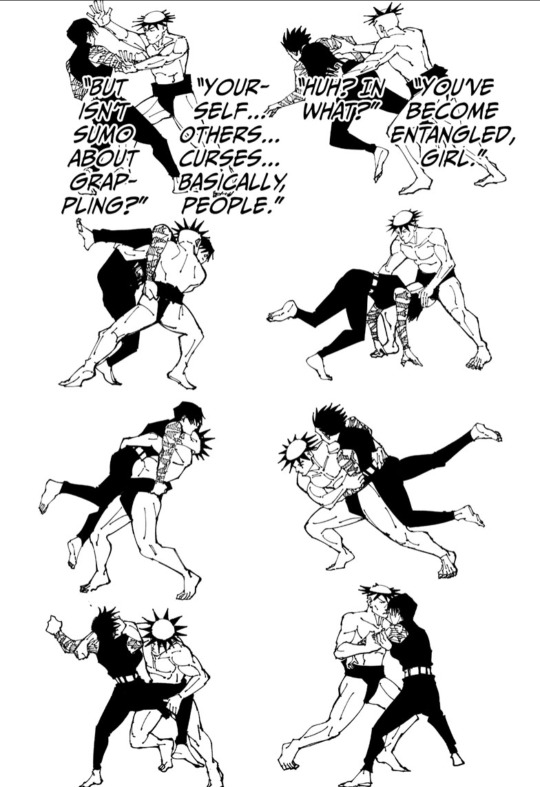

long post to say: i honestly love her and i think ppl often ignore how entrenched her story is in the female experience bc they just see how buff she is.
377 notes
·
View notes
Note
I understand blaming boymoms for how their sons act entitled and rude towards women because yeah that is the truth. Parents influence their kids behavior, especially at a young age, and women end up being misogynistic for social acceptance. However, I think what gets lost is that if the mother is a misogynist the father likely is too. I think that's what people mean when they say that it's "blaming women" and get defensive about it, yeah women can enforce misogyny but we live in a patriarchal society that demonizes feminism(real feminism, not faux nothing feminism) and women recieve praise and validation for misogyny and "holding other women accountable" like the whole thing about toxic/traditional Masculinity(tbh), and father's enforcing strict adherence to gender roles on their sons and mothers enforcing strict gender roles on their daughters, it's not odd to assume a man whose heavily invested in gender roles would pass misogyny and entitlement onto his son. So people blaming boymoms, and not boydads(redpill freaks, manosphere, Dads being dissapointed in girl children) when their ideologies are want demand misogyny in the first place is weird. Although I mostly assume most people who don't like boymoms(like me) also hate girldads, so this line of thinking doesn't apply to me. But I like to speculate about other people.
DISCLAIMER, my reply here isn't about All Parents but rather observations about parents who have more 'traditional values' about gender, which is unfortunately still a lot of them.
SO imo misogyny in parenting manifests differently in mothers and fathers based on their own gender roles. a mother with internalized misogyny is going to position herself as subservient to the son and father, sometimes to the point of enduring domestic violence. on the other hand the misogynistic father asserts authority over the son and pushes 'masculine' gender roles on him, almost viewing the son as an extension of himself (which is why these fathers tend to be upset at having a daughter--they feel they can't have a miniature version of themselves). and speaking of disappointment at having a daughter, oddly, there's often a 'switch' once the daughter begins to grow up--the mother views her daughter as competition because she, with internalized misogyny, hates to see her own daughter get attention from men, including her own husband. she's basing her entire existence (and thus her daughter's) around men. so while "gender disappointment" over a girl is indeed an expression of misogyny, a lot of parents have very different feelings towards their child before it's actually born, or at least before it starts acting more like an individual. the father overjoyed to have a son may also be the father who abuses his son for not conforming to gender roles or not being a copy of himself. this is because he views girls and boys as so fundamentally different that he was actually UPSET over having one over the other. gender reveals are more like terrible parent reveals, lol. overall these are parents reacting to their ideal version of their child in their heads and not necessarily the reality that they can't predict. both mothers and fathers can enforce misogyny on their kids but they are not doing it in the same ways. their overall belief system is the same, but the way they see themselves in comparison to the son/daughter is what differentiates them.
it's also important to note that criticism of 'boymoms' from men and women is often different as well. a lot of women with a negative view of boymoms are associating boymoms with an abusive ex boyfriend, brother, or father, or their own abusive mother. meanwhile if you have like, an incel criticizing mothers, it will be about the mother not being misogynistic ENOUGH, or generally just having higher standards for mothers over fathers. of course this isn't the case Every Single Time but just a pattern I notice--and I mean, it HAS to be a pattern for a patriarchal system to continue being enforced at large.
also just want to clarify when I talk about boymoms i'm not referring to every mother with a boy but the ones who make it their whole personality and have significant internalized misogyny. i've never really seen the need for parents to gender their relationship with a child like this in general so I tend to not associate the terms (boymom, girldad) with positive things.
113 notes
·
View notes
Text
trans men, studs, butches, trans men who are butches, dysphoric lesbians, dykes who find their gender identity can only be described as dyke, lesbians on testosterone, lesbians who had top surgery & he/him lesbians have always been part of the unique, beautiful & long lesbian history; and will continue to be, for so many years from now. no matter how much you want to exclude them, say their identity “clashes” with their sexuality, undervalue them, degrade them, belittle them, or call them homophobic, transphobic & misogynistic slurs– they will continue to exist, and you can do nothing to stop mothers from birthing more lesbians who confuse you & defy traditionalist ways of thought.
we are tired of people closing their eyes before our long history, history that has always included trans men, butches whose gender identity is “butch”, dysphoric lesbians, studs, and lesbians who go against the heterosexual, dumbed-down & oversimplified vision of lesbianism. the heterosexual misconception that lesbians are attracted to male bodies, that all lesbians are gender conforming & non-dysphoric, hyperfeminine white women– is exactly that; a heterosexual misconception of lesbianism. lesbians have always gone against all of that. some of you are going to call us exclusionists, others will call us nonsensical & hyper-inclusive. and i’m going to tell you all one thing– we don’t care what you see us as. butch lesbians, transmasc lesbians, studs & all dykes in general are going to keep doing their thing, not giving a care for what lesbophobic people see us as. we do not care if our identities “confuse” you, in fact, we are glad they do.
lesbians reject the social class of woman, as the class of woman is heterosexual. the class of woman is the subservient, submissive class– whereas the class of man is the dominant, commanding one. this is based in a heterosexual foundation. as lesbians revolutionarily stand up for liberation, through refusing to be a victim caught up in heterosexist classes & divisions of labor– they attempt to escape the class of woman itself. we must deconstruct the classes, and our historical lesbian warriors have been telling us that for years. it is time non-lesbian feminists start listening to lesbian feminists. it is time non-lesbian feminists start learning from lesbian feminists. we want to help the heterosexual woman, as well: we do not want to harm or exclude her. we want her to see the need for deconstruction of the classes, and the need for an end of heterosexism. heterosexism doesn’t benefit her, and just because she finds attraction to male bodies does not mean that the heteropatriarchy, a system designed by & for men, somehow benefits her. she needs to unlearn homophobia, and start working with her lesbian feminist sisters.
heterosexual love & romance have always been described as some incredible female experience, how childhood boy crushes are the peak of girlhood (oftentimes being told by surrounded authorities which the girl trusts that a boy likes her if he’s straight up abusive to her), how women require heterosexual intercourse, bonds & romance to be happy & satisfied. heterosexuality has always been described as some gateway to female satisfaction, female fulfilment & female happiness. this led to women & girls devaluing their bonds with other women & girls. lesbians actively assault this stereotype. lesbians have been going against this stereotype for so many years; encouraging platonic lesbian relations between women & defining patriarchal heterosexuality as a tool that keeps women subordinate. it has been coerced onto us from the moment we were born. lesbians defy the political system based on performing for men & normative society. this way, lesbianism is not a mere sexuality; it is an outright attack on male privilege over women. lesbianism rejects the notion that women are male possession & servants. under the patriarchy, heterosexuality is a standard– it is the oppressive system’s default. it isn’t simply a “straight sexuality”. lesbians are oppressed on the basis of defying the heterosexist regime, which makes it a double oppression, and a unique lesbian experience of both homophobia & sexism; lesbophobia. lesbophobia is the unique dual oppression lesbians face.
lesbian love should be perceived as a feminist topic. while so many feminists still refuse to highlight lesbian existence & continue to ignore our voices, we will continue to contribute to the feminist movement, as we always have. we are important in women’s liberation, we did so many things for the movement, and our sexual orientation is an important balance in defying oppressive hierarchies such as gender & heterosexism. we won’t ever stop defending women, fighting against the heteropatriarchy & compulsory heterosexuality (& the way it harms heterosexual women, because although het women often turn their backs on us, we won’t turn our backs on them), and other oppressive systems & tools used for waging war against women. lesbianism is beautiful, historical lesbian activists have had fortitude stronger than steel & lesbian feminists have been excluded from the feminist movement for long enough– it is the 21st century, it is time we stop excluding lesbians from feminism.
the reclamation of masculinity, something that is so expected of men, is what often gets masculine lesbians & butches harasses and attacked. butch lesbians, however, aren’t mere masculine lesbians. it is not a sole aesthetic. it has its’ long history that is intertwined with gender abolition, feminism, and revolutionary activism. butch is a gender identity, a revolutionary reclamation of casual masculinity. many non-lesbian feminists, or even toxic lesbian separatists, claim how the butch-femme relations are a replication of the heterosexual regime, the recycling of the heterosexual gender roles, or an imitation of the heterosexual couple. this could not be more wrong. butch-femme relations challenge heterosexism, heteronormativity, and the heteropatriarchy: the love between two non-heterosexual individuals in a non-heterosexual relationship could never somehow possibly be “heteronormative”; especially when the two individuals in question choose to subscribe to two feminist lesbian subcultures that promote gender abolition, revolutionary action & anti-sexism.
and even though lesbians are still subject to conversion therapy, we continue to exist. we continue to exist, regardless of what is being done to us; we have always existed, and we always will exist. the system will never be able to get rid of us, and we will continue creating inconveniences for the system. we adore the mesopotamian & assyrian lesbian women from ancient times who were depicted to be homosexual in texts, as well as the ancient women of egypt, and lesbian women from ancient greece & rome. no matter how much the system may despise us, we will find ways to strike back. we are willful, and we do not give up. we do not surrender to the colonizer of our bodies, and that is why i love lesbians & lesbianism. we are real activists, and we try our best to strengthen universal sisterhood; even though we are more often than not excluded & segregated from it. i thank my mother for having given birth to another butch lesbian, another butch lesbian with the willpower of a tiger. i have the willpower for social change– and i stand right next to my sisters against this power-sick structure that wishes to nihilize us. we will take it down together.
#butch4femme#butch lesbian#lesbian#radical feminism#gender abolition#radblr#lgbt#queer#i love women#dyke#ftm lesbian#ftminism
43 notes
·
View notes
Text
THE WAY KRIST INCLUDES WOMEN

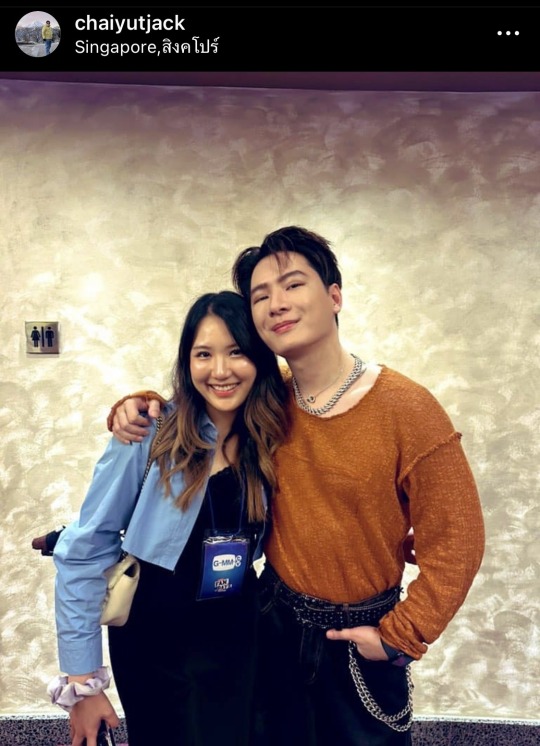
[left: Krist and Namtan; right: Krist and his sister]
Once, my friend had the opportunity to work with a singer from a group I used to follow. When the project was done, I asked my friend what she thought of him, and she said, “He’s fine,” but I could tell something about the experience bothered her. After a few minutes of talking about the job itself, she said, “You know what it was about him? He doesn’t care about women. Like, he wasn’t rude to me or anything. He didn’t say anything negative about women, and he didn’t treat any woman on the project poorly that I saw. He just doesn’t think about us. At all. Whenever I met with him to discuss the project, or whenever we’d have small talk about culture or society or whatever, it just became abundantly clear that his whole life and worldview is very male-centric. I’m used to men being openly patronizing or downright malicious, and like, this guy’s whole career has been female-facing, so I went into those interactions expecting him to be either extremely cool with women or a total misogynist. But nah. He’s just, y’know. A man who doesn’t include women in his world. Other than that, he’s fine.”
I thought about that for the rest of the week. I’d been a fan of this guy’s group for years, and his group had been all men in a company of all men. He’d been on TV shows with women, of course, and I remember him being friendly with some former costars, but all the people I knew from his inner circle were, in fact, men. I was in my late twenties at the time, and I remember thinking, “There’s something inherently odd and exploitative about famous men who make their career off the money and support of women but don’t include women in their personal lives.”
It’s something I’ve paid attention to ever since. When I became a fan of Boun, for example, I noticed that he has female friends from university, and that he was extremely protective of all the girls in Wabi Sabi, which made me feel confident that he was a good egg. By that same token, I’ve also noticed when other actors are predominantly friends with men, and when they only seem to view women as support systems or sources of personal validation.
Krist is just…comfortable with women. And more importantly, women are comfortable with Krist.
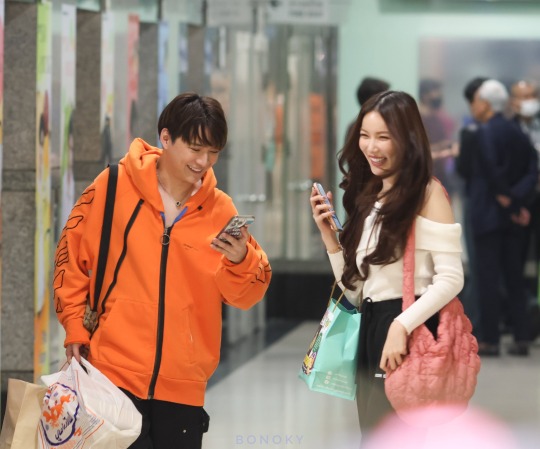
[Krist and Mook]
Back in 2020, I noticed two things about Krist regarding women: 1) he had a crush on Namtan (don’t we all), and 2) after SOTUS, GMMTV steered Krist away from BL to star in lakorns opposite women.
That was fairly standard. Just a famous dude existing around women for work. No red flags, no green.
What I noticed over time is that Krist is still close with a lot of the women he worked with, and that his inner circle includes women.
And when I say those women are comfortable with him, I mean that not just in a, “He’s fine,” sort of sense. They’re comfortable goofing around with him, being physically close to him, and hanging out with him. They speak highly of his character, about how he treats them as a senior, a junior, a coworker.
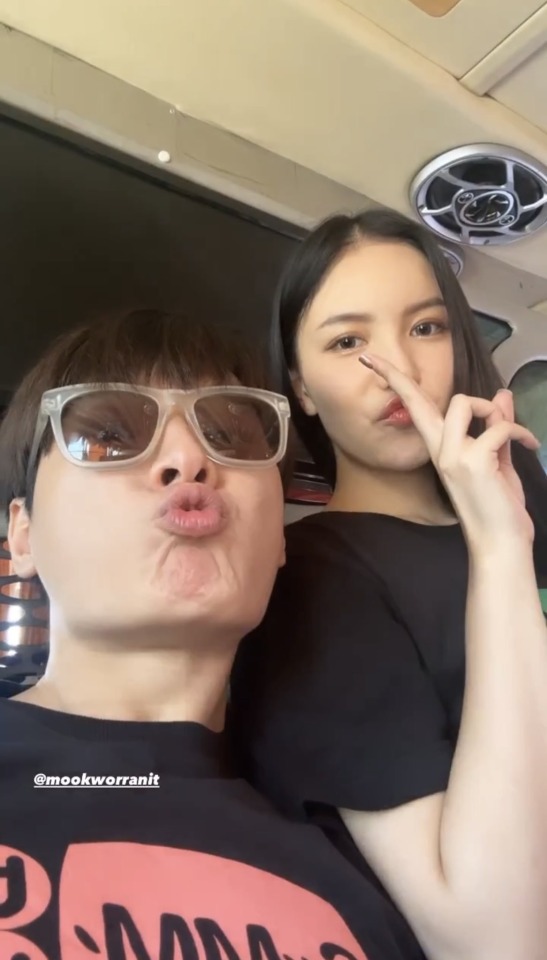
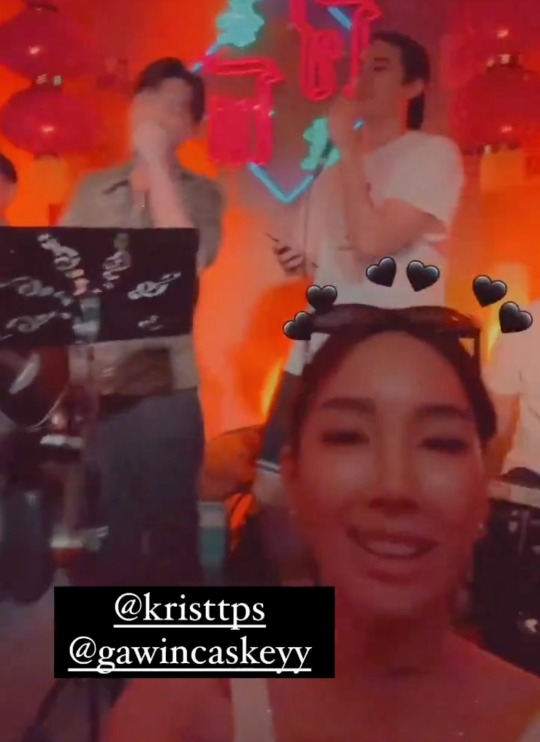
[left: Krist and Mook; right: Aye with Krist and Gawin]
Last year, Aye went so far as to say that in all of GMMTV, she felt closest to Krist and Gawin partly because they made her experience making Be My Favorite so warm and comfortable when usually these male-oriented productions can alienate the women involved. She’d also worked with Krist before, and she said she feels completely at ease with him.
The work part I had backed up recently by a woman my friend spoke to: she said Krist goes out of his way to include every single person involved in a production. Not just the actors, but the crew and the staff as well. Rather than form a small clique with the people he already knows, Krist makes everyone feel like they’re in his clique. He treated everyone with respect regardless of age, gender, or role in the production.
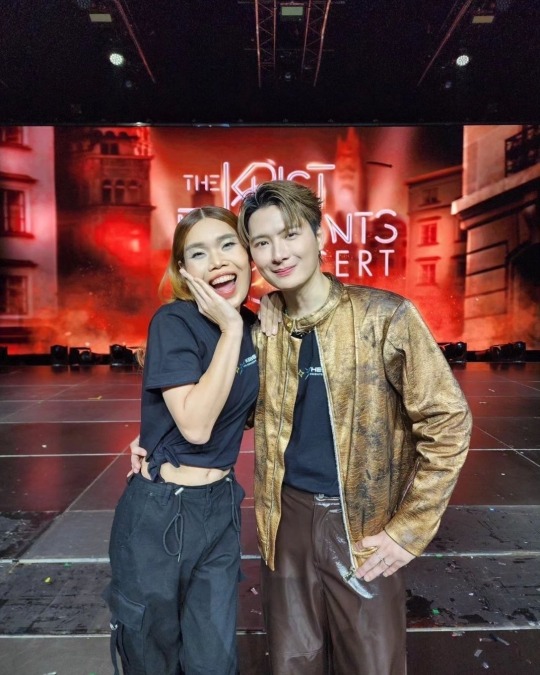
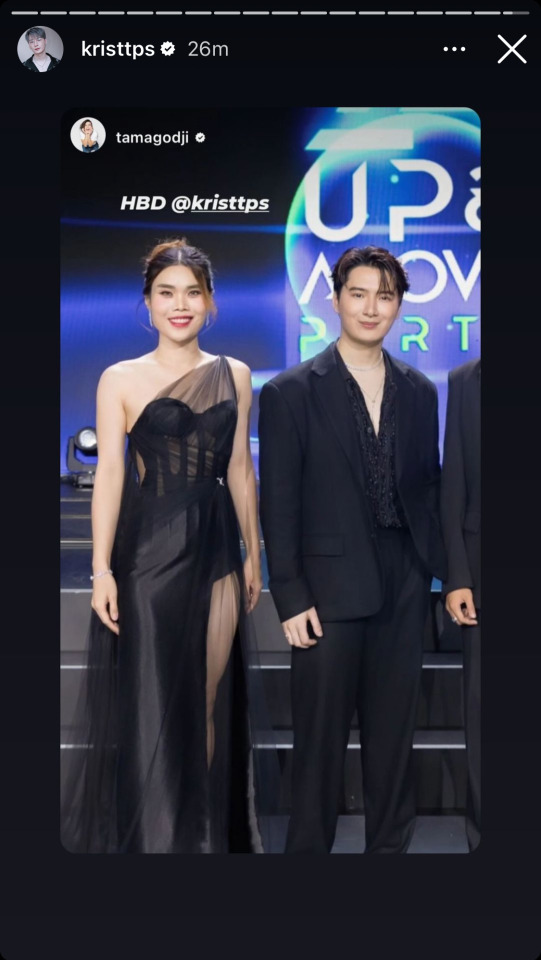
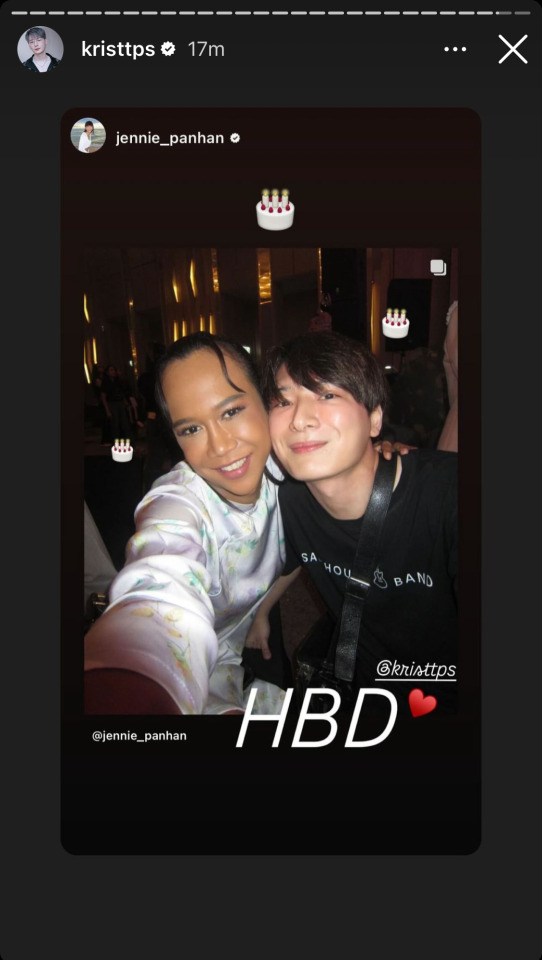
[left: Krist and Godji; center: Godji’s birthday message to Krist; right: Jennie’s birthday message to Krist]
He’s famously devoted to his mothers, both his industry mother Godji who’s been looking out for him for years, and his birth mother pictured below from an episode of ArmShare (with English subtitles) in which Arm features Krist’s mother and shows how lovely and supportive their relationship is.
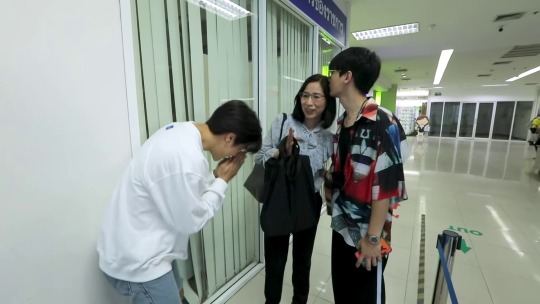
In the late 90s and early 00s, Krist’s family went into debt, and he took thankless jobs in university to try and help them out of it. The success of SOTUS is what got his family all the way into the green, and to this day Krist freely gives his parents access to the money he makes so they can live a better life. They still work (his mother’s office is pictured above), but because of Krist, they’re able to relax into their older age.
He’s also been actively protective of MilkLove over the past several months. When he interviewed them for Livehouse, they were noticeably open and confident in their answers. And yesterday, when MilkLove, KristSingto, and JoongDunk arrived in Singapore for their fan meetings today, the chaos in the airport created some genuine panic among security and the artists themselves.
In the video, you’ll see a man in a red shirt who was dogging MilkLove with his phone stretched out to capture himself with them. Krist, in gray, stretched his arm out to shield them from him. He and Singto did their best among the madness to protect MilkLove from the overzealous fans and from the confused security guard who pushed Milk out of the way thinking she was a fan, too.

Surging crowds like that are terrifying enough for anyone, but especially for women when they’re being actively pursued by larger men with no respect for their physical space. Krist and Singto both understand from personal experience how wild these situations can get, and I’m relieved they were both so quick to act for MilkLove’s safety.
I thought I must’ve made a thread or a post about this before, but I only really mentioned it once in a tweet a few months ago, so after this incident with MilkLove, I decided to zero in on one of my favorite things about him. Because these days, it’s not enough for me that a man is neutral about women. For me to support any man’s career, he has to be actively kind, actively supportive, and actively sharp with the men who aren’t.
The days of neutrality as the standard are firmly in the past, and it’s important to hold expectations for men high—especially famous men.
#krist perawat#just adding this to my ongoing perawat encyclopedia#i fully expect more godji content with her son once they start filming ex-morning :’)#milklove#godji tachakorn#mook worranit#namtan tipnaree#aye sarunchana
43 notes
·
View notes
Text
extremely long essay-adjacent post about female representation in the captive prince
capri is interesting bc i dislike the lack of female characters, but knowing the way that people are treated in vere and akielos, i kinda feel relieved that we don’t see many women.
like idk, gender stuff is complicated. it is a double standard, that seeing female characters in the same positions as the men in these books would just feel different. given how women have been treated and continue to be treated in real life society, it’s almost escapist fantasy within itself to see this world where we don’t have to really look too hard at women being abused and oppressed. and in addition to real life, we get that in plenty of fiction already, written mostly by men, often in a way that feels condescending or fetishizing.
capri’s male-dominated cast comes at the expense of really seeing women on the page, but the few female characters do seem to be intentionally written in positions that don’t feel disempowering or misogynistic. vannes holds her position of authority through similar means to the powerful men, and she’s just as morally questionable as the rest—no exceptions are made. jokaste is authoritative simply by her characterization, and uses her femininity in as a tool to put herself in higher stations. like, that woman has a uterus and she knows how to use it to her advantage. and then there’s the vaskian women, like this entirely separate matriarchal warrior society, and we really only get a peek into whatever the hell they have going on.
we know, logically, that there are plenty of female slaves and pets and prostitutes, almost undoubtedly abused and undervalued wives of men in the nobility. the regent's court is male-dominated by choice. kastor, i would bet, is similarly misogynistic. the male characters we follow are explicit misogynists, gay and disinterested in women, or like legally forbidden from any heterosexual romance they might want to have. gender roles and sexual taboos run deep in this world. we know that women are out there, suffering, just like damen and erasmus and laurent. but pacat shows us women who are not suffering instead. and that, to me, is something.
but like, i think the instance of womanhood that’s most interesting to me in the series is actually the absence of it in laurent and damen’s lives. the characters and story we follow are so steeped in masculinity and patriarchy—but there are women in this world. they are up to things, and i think pacat has given their existence thought. i can't know her intentions for sure, but i sense that she might have made them absent in our protagonist’s lives for a reason.
becauseeeee who is the person to finally Beat the regent? a female character who you are meant to ignore, who appears to be a random bystander, but reveals herself to be mindful and caring. a woman who, just like damen and laurent in book 1, is relatively powerless in this society but left with very little to lose. loyse is the closest thing to like… a just kinda average woman we see in this entire series. she’s not partaking in the debauchery of veretian, akielion, or vaskian nobility. she’s not playing power games with her body or sexuality. she’s basically just, like, the normalest person in the room, full of people like fifteen feet deep in a pool of power struggles, sexual depravity, manipulation, politics, and war strategy. she has her head above water, at least after aimeric’s death. that isn’t a gendered quality by nature, and i hate the implication that women are more likely to be level-headed, good advocates or caretakers, etc… but i don’t think that’s what i’m trying to say here at all.
because loyse, like… isn’t a perfect mother. she either completely missed or knowingly enabled horrible things happening to her son because her husband wanted to social climb. i’m not sure if she knew, during aimeric’s childhood, exactly what was going on with guoin, the regent, and aimeric. it might say somewhere (i hope it does!) but my skimming yielded nothing. i think it would make the most sense if loyse only found out after aimeric’s death, like on the road with guion and the main characters. she clearly spoke to laurent about it at some point, and didn’t tell guion that she planned to testify against him. regardless of when she found out, she’s just over it all at the trial, and finally speaks her mind.
loyse being a woman doesn’t inherently make her more likely to be wise or compassionate than the main characters—but it’s more like, idk, being so far removed from the very male-centric story that we see, it allows a character like her to have the clarity to essentially defeat the final boss everyone else has been struggling to fight for three entire books. loyse really just said, “hi. fuck you all. my son is dead because my asshole husband made a ‘gentleman’s agreement’ with him as a bargaining chip. i’m not delusional, i know this is wrong, and im not going to shut up about it to appease this depraved and cowardly court. also the regent killed his brother, because i know you assholes don’t care about my son and never will.” and that is the first domino in the regent’s defeat.
so, like… what if damen and laurent had been written with loyses in their lives? women who weren’t there to have sex with them, in damen’s case? mothers and sisters and friends? what qualities could they have then developed in themselves, so much sooner than they do in the series?
if more of these characters were women—if more women were Involved In The Story, in general—would it have been as brutal or difficult as it was? could things have been better communicated, would social reform have happened sooner? would damen and laurent (especially laurent) have had the same experiences that so strongly define who they are? it’s a slippery slope to assign traits to gender, i know, but i think there is something to be said for the different ways men and women handle intellectual and emotional problems—especially if they’ve been socialized heavily based on their gender, which does seem to be the case for this world. if damen had a mother or a sister or a simply platonic female friend, do you think he would have more quickly realized some of his own ethical blind spots re: sex and consent? if laurent had a mother or sister or female friend, do you think he would have been protected from the regent, and given more opportunities to feel safe and unsexualized? if there were actual authoritative women in the venetian royal bloodline, would the regent have been able to take over, and make the court so male-dominated in the first place?
it’s like that meme, “x media (image of giant book), x media if character had a gun (very short book).” i think, fundamentally, that capri would not have been able to tell the same story if more female characters were involved. and to be clear—that is not an excuse to exclude female characters, because i fucking love female characters. it would almost certainly be a better series with more women thoughtfully involved, but the point is, it wouldn’t be the same. and i do admire that pacat seems to understand that there are differences between men and women, in many ways, and doesn’t just like… write a character she means to be a dude, and then genderswap. or write an character who’s in essence genderless, insert them into this very gendered society, and then spin a wheel to see what pronouns they use.
i’m not sure exactly what point i’m trying to make here, but i’ll leave two related excerpts for your consideration. actually, yes, i do know my point, and i’ll say it with conviction: simply thinking to put female characters in a story, does not make it a story with thoughtful female characters. and capri, as a series, is defined by its thoughtfulness to me. i cannot fully commit to the suggestion that its lack of female characters is inherently misogynistic, because i think that lack of female presence is a character within itself. and more than anything, it’s an ongoing flaw of fandoms in general, people in general, to either want women to be 1) absent, so they’re not in the way of the men’s stories or 2) simple and archetypical, to check a box for inclusion. but there are other options. i like those options more.
to truly want female representation in a misogynistic world is to want to see the complexity of womanhood, both in its presence and its absence. and i think if cs pacat ever decided to take on a female perspective, intentionally, as the main point of a piece of writing, it would be masterfully done. i would love to see her write women, but i want those women to truly be the main characters. and i never want to tell anyone what they should want to write about.
capri is what it is. and to its credit, i do believe that this series both considers and values the female perspective much more than the fandom seems to acknowledge. the real problem to me rests with fandom and the society it reflects, rather than the story or its author.
excerpt #1, from the summer palace by cs pacat, author of the captive prince series:
‘My mother planted these gardens,’ said Damen. His heart was pounding. ‘Do you like them? They’re ours now.’ Saying the word “ours” still felt daring. He could feel it mirrored in Laurent, the shy awkwardness of what was so dearly desired. ‘I like them,’ said Laurent. ‘I think they’re beautiful.’ Laurent’s fingers found his again, a small intimacy that had him overbrimming. ‘I don’t think about her often. Only when I come here.’ ‘You don’t take after her.’ ‘Oh?’ ‘Her statue in Ios is three feet tall.’ The corner of Damen’s mouth twitched. He knew the statue, on a plinth in the north hall. ‘There’s a statue of her here. Come and meet her.” It was part of the nonsense they were sharing, a whim, to show Laurent. He tugged; they came to an arched open garden. ‘I take it back, you’re just like her.’ Laurent said it looking up. The statue here was bigger. Damen was smiling; there was delight in seeing Laurent explore himself, a young man who was sweet, teasing, at times unexpectedly earnest. Having made the decision to let Damen in, Laurent had not gone back on it. When the walls went up, it was with Damen inside them. But when Laurent came to stand in front of the statue of his mother, the mood changed to something more serious, as if prince and statue were communicating with each other. Unlike in Patras, it wasn’t the custom in Akielos to paint statues. His mother Egeria looked out towards the sea with a marble face and marble eyes, even though she’d had dark hair and eyes like himself and his father. He saw her through Laurent’s eyes, the old-fashioned dress of marble, the curled hair, her high, classical brow and outraised arm. Damen realised that he didn’t know how tall his mother really was. He had never asked about it, and had never been told. Laurent made a formal Akielon gesture that matched his chiton and the gardens, but was different to his habitual Veretian manners. Damen felt his skin prickle with strangeness. It was part of Akielon courtship to seek permission from a parent. If things had been different, Damen might have knelt in the great hall in front of King Aleron, asking for the right to court his youngest son. It was not that way between them. All their family was dead. ‘I’ll take care of your son,’ said Laurent. ‘I’ll protect his kingdom as if it were my own. I’ll give my life for his people.’ Above them, the sun was high and bright, and encouraged a retreat to the shade line. The boughs of the trees around them were heavy with scent. Laurent said, ‘I won’t let him down. I promise you.’
and an excerpt from the captive prince fan wiki.
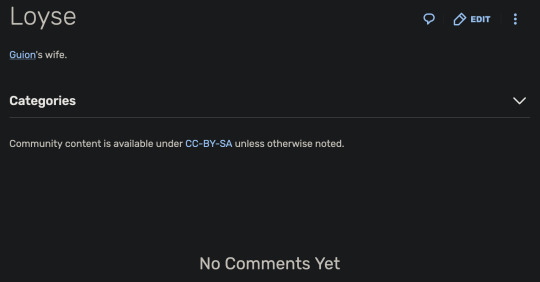
#capri#sam reads capri#(kinda)#captive prince#prince's gambit#kings rising#laurent of vere#damen of akielos#okay i went pretty hard on this one ngl#PLEASE share your thoughts
63 notes
·
View notes
Text
I just saw a post in the "narcissistic abuse" tag where someone said that her narcissistic mother forced her into modeling and forced her to follow strict beauty standards. She also had a psychotic boyfriend who was controlling and accused her of cheating if she didn't respond to texts quick enough.
That has nothing to do with mental illness. Your mother is not a narcissist. She's a typical authoritarian asshole who considers you her property because society encourages that. Your boyfriend is not psychotic. He's a typical misogynistic douchebag who thinks women exist for his own pleasure and nothing else.
Child beauty pageants exist. The diet industry exists. That would be impossible if beauty standards were only upheld by mentally ill people.
You can't solve a systemic problem by blaming a convenient scapegoat.
71 notes
·
View notes
Text

Silent Hill 2 critically examines and challenges many of our presupposed notions of gender roles, marriage, and the nuclear family unit. The game would not resonate as hard as it does if James and Mary were not married, because marriage carries with it a heavy emotional and cultural baggage.
In this post, I'm going to talk about cultural misogyny, how it's woven into the narrative. Apologies if it's not very well-structured, since I'll be offering my thoughts on an off-the-cuff basis.
The misogyny SH2 explores is a lot subtler and more structural in nature than is portrayed in the remake. While the remake is more blatant and not nearly critical enough of its portrayal of James as a more stereotypical hero, the original attacks the very premise that it's necessarily "wrong" for a woman to lose her worth via a loss of physical beauty, and that a man needs to perform the role of "protector" at the cost of being considered a failure.
To that end, I think some vital nuance is lost when the remake recharacterizes James as a more typical rugged Stronk Man, stoic and impatient, egotistical, and way more prone to violence than his original counterpart.
Original!James runs from his problems whenever possible. What's more, his cowardice serves a thematic purpose of showing us that even well-intentioned "nice guys" can be misogynistic. Because, again, the misogynistic framework that upholds Western constructs of marriage and family is structural, not individual.
James cannot meet any of the girls or women he meets in the eye whenever they castigate him. This in and of itself challenges the notion that James ought to be "in charge" of any of them.
Maria's emasculation starts early, and it doesn't really let up, resulting in James' mixed feelings of arousal and repulsion.
Angela, likewise, rejects being considered an object of pity, for pity implies condescension. James cannot save her by white-knighting her problems.
James initially feels compelled to "protect" Laura as a presumed damsel in distress when, ironically enough, she's the safest of anyone in Silent Hill. In fact, she places James in the position of "damsel in distress" by locking him in a room full of monsters.
This is a game where the women lead and James follows: a gendered frustration embodied by Pyramid Head, who cannot be placated, only fled.
It's no coincidence that most of the monsters you encounter are feminine in nature - rather helpless, sickly, and pathetic at that - while the one monster you cannot beat into submission is an intense expression of hypermasculinity.
Unlike James, whose emotions render him "less than" in the eyes of a patriarchal culture, Pyramid Head is stoic and never speaks. Pyramid Head is powerful and virile. Pyramid Head does not succumb to grief or suffer feelings of guilt for his misdeeds. Pyramid Head is a lone wolf that relies on no one else. Pyramid Head is "strong" enough to carry the psychological burden represented by the Great Knife with ease.
Although some degree of sexual frustration does factor in here, it's not the only message Team Silent were trying to impart via the monster dynamics. Pyramid Head is repeatedly seen dominating and subjugating the more "feminine" monsters. It doesn't take much onion-peeling here to see that James is harboring some subconscious grudges over his "failings" to meet society's standards of what a man is supposed to be like.
He isn't strong: he can't open a fridge without Maria's help. He isn't powerful: reading all the medical textbooks he could didn't save Mary. He isn't courageous: he can hardly look Maria or Angela in the eye when they force him to confront uncomfortable truths. He isn't, even, particularly respected at times: Laura locks him in a room just to laugh at him. The only person he has a leg up on is Eddie, but after a brutal shootout in a literal meat locker: one of the many implications being that this kind of pressure to be considered "real men" can potentially turn human beings into butchers for a sliver of domination.
For all intents and purposes, James is a "failed" man, just as Mary is a "failed" woman. By falling ill and losing her sexual allure, she failed to meet the culturally-ingrained expectations of a wife.
It's worth noting that both Mary and James hold these expectations and biases without realizing it. It's simply more obvious in James' psyche because we see the manifestations firsthand.
But Mary holds these values to be self-evident, too, when she laments that between the disease and the drugs, she looks "like a monster." Because patriarchy has taught her that a woman's worth lies in her looks, she laments the loss of her beauty to disease; she becomes worthless, "undeserving" of flowers (that is to say, basic decency on her husband's part).
She even laments being "ugly" and "disgusting" James in her last letter to him, as if she's failed him somehow through contracting an illness she never asked for.
Although the statistic that men divorce their wives if their wives fall ill is not necessarily true, it is true that women, as the presumed caretakers of the family, tend to survive at rates less than men if they do fall terminally ill due to a lack of support system.
We further see the mother's failure when Angela admits that her own mother said she (Angela) deserved her rape at her father's hands.
Furthermore, these gendered themes are expressed through the game's treatment of Maria. As a sentient entity born from James' selfish wishes, Maria lies trapped in an existentially horrifying state: objectification.
It's interesting that Maria professes interests and dislikes in Born from a Wish and early in Letter From Silent Heaven - in the former, she confesses that she's not much for literature, and in the latter, she opines "I hate bowling" - but slowly loses her individuality as time goes on. In addition, Maria stops insisting she's "real" and starts insisting that she can be whatever James wants her to be.
Eventually, she assumes Mary's voice and face (despite James having already noted that she bears an uncanny resemblance to Mary because of her face and voice) out of a false hope that doing so will ingratiate her to a man who doesn't want her.
Maria does not live for herself but owes her existence to a man. She becomes anything James needs her to be: a lesson taught when she dies; bait on a hook when she attempts to seduce him; even a version of his dead wife that will "never yell at [him] or make [him] feel bad." She bears Mary's face and voice, but not much else. Her thoughts and feelings ultimately do not matter because she is "not Mary."
Maria is treated like an object, despite being flesh and blood, and she has internalized this, displaying an unnerving willingness to contort herself in whatever shape necessary to keep James, for, again, without James she would not exist. When James states that he no longer needs her, she cries, "How can you throw me away?"
All of these things form the overarching reason why the renewed prioritization of combat disturbs me. It's almost like the remake is saying that violence is justified, but more specifically, the kind of gendered violence that culminated in James smothering his terminally-ill wife. Making combat "satisfying" defeats the point that combat shouldn't be a reward for violence.
Making the monsters extra aggressive so that combat is "provoked" and therefore justified, in fact, hits uncomfortably close to the nerve of "she brought it on herself." The idea that Mannequins now bumrush you when in the original, they only moved once perceived, allows the player to ignore how James must go out of his way to commit violence.
James, likewise, going "You're not here anymore" in the In Water ending does not bode well for his respect for Mary as a person, if he thinks his duty to her memory stops the moment her heart does.
In addition, Remake!James is more egotistical and entitled than Original!James.
While this may not inherently be a problem, I feel this has the potential to have audiences let James off the hook in a sort of Calvinist way. By dismissing his poor judgment and misdeeds as a result of his gender. "Oh, he was always an asshole, he deserves whatever he gets," rather than the more salient question, "What would we do in his situation? How could we restructure the ways we think about marriage, family, and gender roles so that the vulnerable don't slip through the cracks?"
As I've noted in previous posts, Remake!James' speech patterns reflect a more self-centered nature. When he tells Angela that his goal is to find Mary following Angela's emotional breakdown, he frames it as though Mary is his possession:






Notice how his priority is protecting his self-image as a good person and not in comforting Angela or trying to defuse the situation, like in the original.



Remake!James be like "Listen here, you audacious bitch, I don't know who you think I am, but I'm #notlikeallmen. I just want to get my wife back. 😤"
37 notes
·
View notes